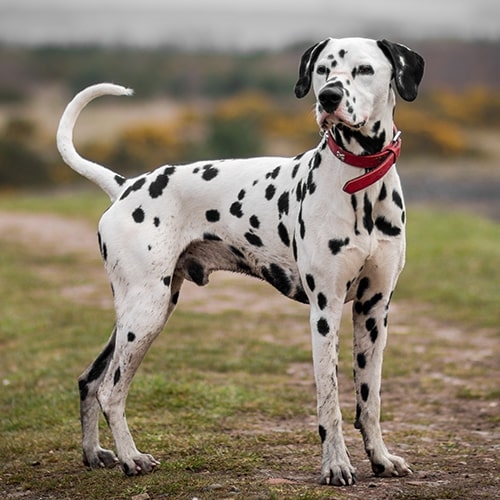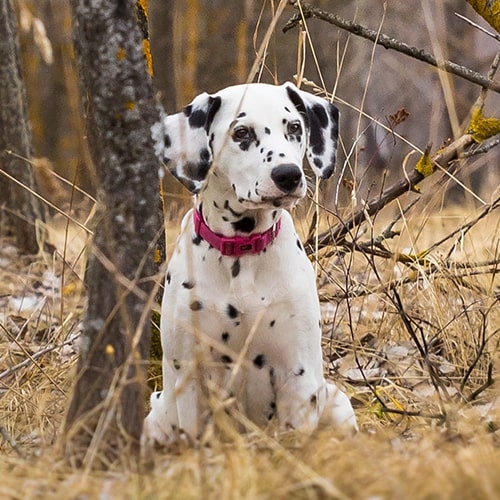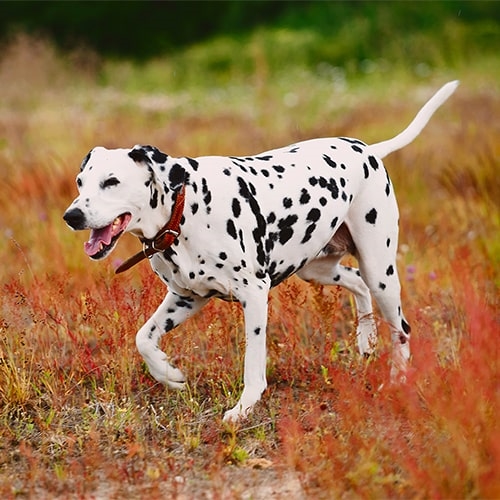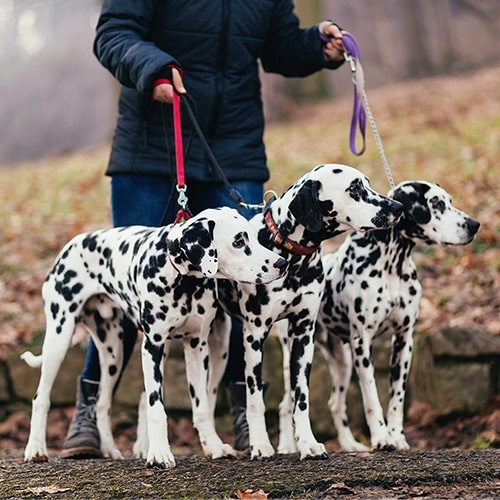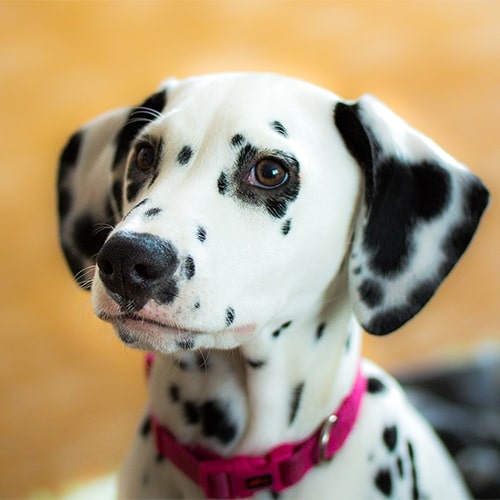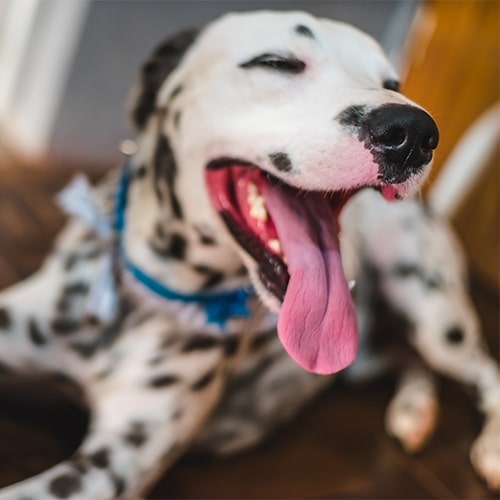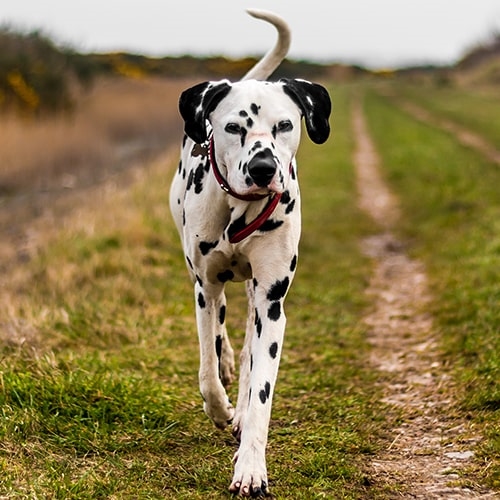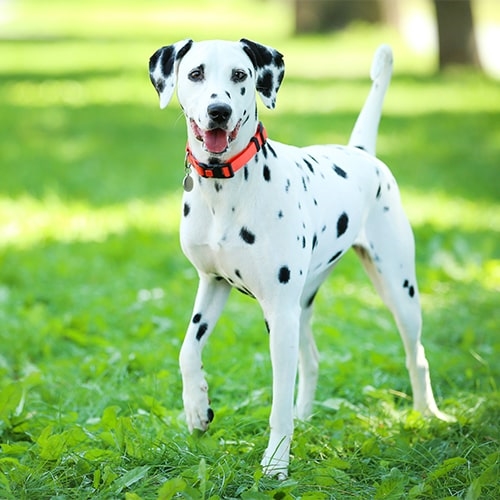| Size | Large |
|---|---|
| Average height | 56-61 cm |
| Average weight | 18kg-27kg |
| Average lifespan | Over 12 years |
| Minimum exercise (per day) | 2 hours |
| Coat length | Short |
| Minimum cost (per month) | £105 |
Dalmatians are well known for their beautiful spotted coats and are incredibly active and lively dogs. Although they were never bred for a specific purpose, they used to accompany horse-drawn carriages and guard the passengers.
Their friendly personalities and loyalty to their owners are a huge draw for anyone looking to get a Dalmatian. They’re a unique breed and this can make them popular, but they definitely need an active household so they can go on plenty of adventures.
Common health problems in Dalmatians
Dalmatians are beautiful dogs who love to be active but unfortunately, like many purebred dogs, they are prone to certain health issues associated with their breed. There is currently testing and screening for some of the problems Dalmatians can have.
If you’re thinking of buying a Dalmatian puppy, we’d recommend getting one from a Kennel Club Assured Breeder, as they meet extra requirements including health screening. Parents having the relevant screening reduces the chances of your puppy being affected by these upsetting conditions. We’d also recommend discussing the medical history of your potential puppy’s parents and grandparents, and think very carefully before taking on a dog with any of the health conditions listed above in the family line.
Some of the health conditions Dalmatians can develop include:
- Atopy – sensitivity to certain allergens such as pollen and dust mites, causing itching.
- Urinary conditions, including urolithisis (bladder stones) – Dalmatians can carry a gene which means they can’t process a substance called uric acid so it is excreted in the urine, uric acid can then deposit in the bladder and sometimes kidney. This can cause irritation, infection or even a blockage, which requires urgent veterinary attention. There is a DNA test available for this.
- Epilepsy – a brain disorder which can lead to seizures.
- Deafness. There is BAER testing for this.
- Hip dysplasia – where hip joint that doesn’t fit together perfectly, which will eventually lead to arthritis. Before breeding, dogs should be screened by x-rays through the BVA/Kennel Club Hip Dysplasia Scheme.
If you want to minimise the risk of your dog getting problems due to exaggerated features, you can read our advice on choosing a pedigree dog.
Caring for your Dalmatian
Dalmatians can be great pets for active households as they love nothing more than spending time with their owners and burning off all their excess energy. Due to their stamina and muscular build, they may not suit every household and shouldn’t be left unsupervised with children, vulnerable adults or older people. You’ll need to give them plenty of exercise to keep them happy and healthy.
Like any dog, Dalmatians can get bored easily. They need to be physically and mentally challenged and need plenty of company to prevent them becoming destructive and potentially chewing your furniture to pieces. The more there is for your Dalmatian to get involved in, the happier they’ll be.
Dalmatians and barking
As with any dog, Dalmatians are likely to make noise and it’s down to the individual dog how much they bark or vocalise. Dalmatians aren’t known for being particularly vocal, but a bored or lonely Dalmatian may see barking as a way of letting you know they’re unhappy. If you’re having problems with excessive noise or barking, we recommend seeking the advice of an accredited behaviourist.
Training and socialisation
Dalmatians can be strong willed so they’ll need ongoing positive, reward-based training and plenty of patience! For experienced owners, their intelligence means they can be easy to train as they’ll really enjoy learning new things. If you aren’t an experienced trainer, or are a first time dog owner, then you should ask for the help of an accredited trainer.
Socialising your Dalmatian as a puppy with lots of other dogs, different people and types of experiences will help them become a confident, well-rounded dog. Dalmatians need company so we would recommend a household where there is always someone at home with them, but if this isn’t possible you should never leave your dog alone for more than four hours. As Dalmatians can suffer from separation anxiety, you may need to train them to be left alone for very short periods.
Exercise
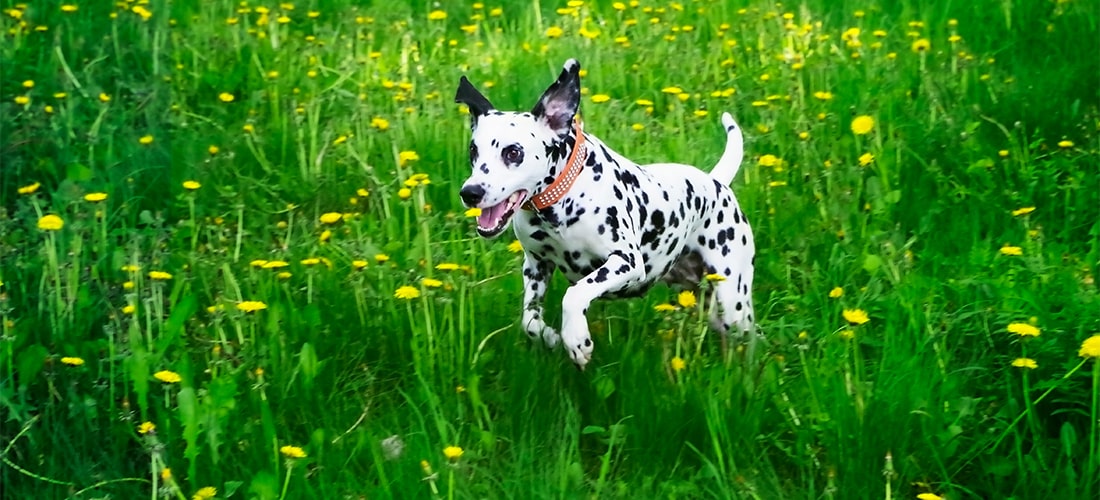
Dalmatians are full of energy and like to be on the go as much as possible so they suit active families with enough time for their needs. In the past, Dalmatians were used as watchdogs and ran alongside carriages and are therefore very energetic dogs. They are strong dogs so don’t forget to train them to walk nicely on the lead when you’re out and about.
Dalmatians are so high energy they need a minimum of two hours of exercise every day. This needs to be done in at least two walks, ideally with a chance to run in a secure area. On top of this, your Dalmatian will need plenty of playtime, free time in a secure garden and training sessions to keep their brains active. Because of their intelligence and desire to run and play, Dalmatians do well at Flyball and agility. Have a look for clubs local to you where you can get started.
Grooming
Dalmatians have very low maintenance coats so they’re ideal if you’d rather spend your time playing with them than grooming them. Unfortunately, they are really big shedders! Dalmatians aren’t ideal if you’re quite house proud or have fur allergies because they shed a lot throughout the year, more so during spring and autumn.
Dalmatians are known to suffer from skin allergies and certain products can make this worse, so speak to your vet if you’re looking for a dog shampoo to use on your Dalmatian.
Dalmatians and children
Dalmatians can be friendly dogs and good with children, but they are very high energy. They tend to be better suited to households with older children as their larger size and strong build means they could knock over smaller children accidentally. As Dalmatians can be very excitable when they’re younger, they may be a bit of a handful for adults unfamiliar with the breed. It’s important to always supervise your Dalmatian with children and vulnerable adults.
Dalmatians and other pets
A well socialised Dalmatian should be fine with other dogs. They are not known for being aggressive and so plenty of positive experiences with other dogs from a young age will help develop their friendly personality.
As Dalmatians were not bred for hunting or herding, if they have grown up with another pet in the house they should get along fine. That said, always supervise your Dalmatian with smaller pets and introductions should be done very carefully – even the most placid Dalmatian may get the urge to chase!
Food
Your Dalmatian’s diet will vary depending on their age, lifestyle and any medical conditions it may have. You’ll need to feed them a complete, commercial dog food to keep them slim and healthy.
Your vet or vet nurse will be able to tell you how much your dog should be eating if you’re not sure. You should feed them a good quality, commercially available and complete dog food and it’s usually recommended to split their daily allowance into two meals. If you give your dog an occasional treat or use treats for training, remember to take this into account and reduce their daily meal allowance to avoid them gaining weight. Treats shouldn’t make up more than 10% of their recommended daily calorie intake or they can unbalance their diet.
You can try to feed your dog at the same time every day to get them into a routine. Remember to leave a gap after eating and before exercising.
The cost of owning a Dalmatian
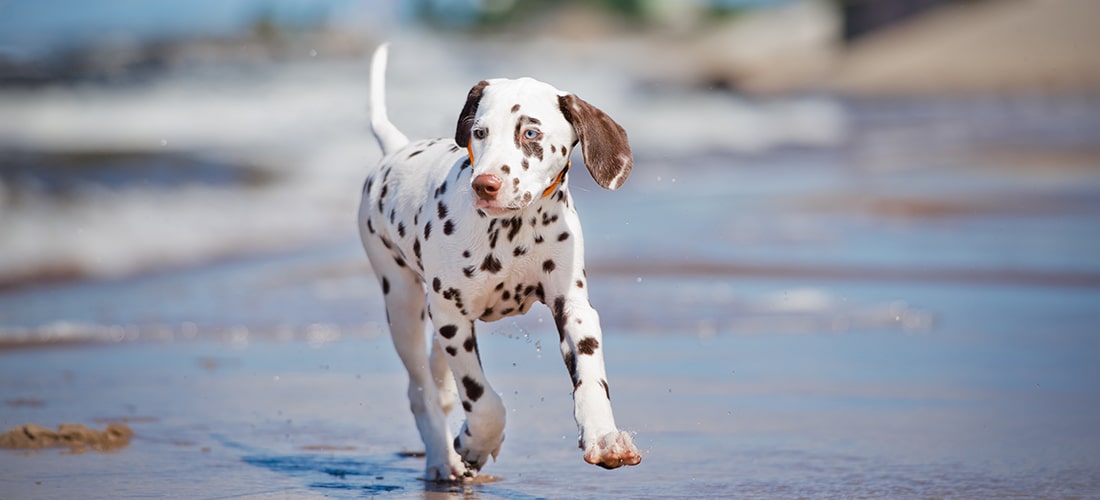
You can expect a Dalmatian to cost you a minimum of £105 per month after purchase and set-up costs and over £17,000 across their lifetime.
Costs you’ll need to think about include:
Purchase costs
Adopting an adult dog from a rescue centre may be a cost-effective option, with the added advantage of giving a home to a pet who really needs one – check if the rehoming centre you’re looking at asks for a donation for rehoming.
If instead you’re buying a puppy from a breeder, you’ll need to factor in the cost of the pup. Beware unusually cheap puppies as they could come from a puppy farm. If you’d like to buy a pedigree Dalmatian puppy, we recommend looking for a Kennel Club Assured breeder. These breeders must do extra health tests and meet certain standards of breeding.
Set-up costs
- Puppy vaccines – if you rescue a dog, reputable centres will often vaccinate them for you. Remember that ongoing booster vaccinations will be needed to continue their immunity.
- Neutering – you should usually arrange for your dog to be neutered at around 6-12 months old, though your vet will be able to advise you exactly when is best. Check prices at your local practice as these will depend on your vet and where you live. Some rescue centres will neuter any dogs they rehome, saving you this cost.
- Equipment – including a collar and tags, lead, harness, dog beds, dog bowls, pet-safe toothpaste and toothbrushes, grooming brushes and toys. Keep in mind that all these will need to be replaced with wear or damage or if your dog outgrows or damages them!
Ongoing costs
- Food.
- Preventive healthcare – budget for routine vet visits to help stop your dog getting ill and catch any problems early. They need annual check-ups, vaccinations and regular flea and worming treatments. Check if your vet offers a health care plan as this can help spread the cost throughout the year.
- Vet bills* or pet insurance – if you don’t have pet insurance and your dog needs veterinary treatment for an injury or illness, costs can rapidly mount up. Check what’s covered and what isn’t when comparing policies.
- Accessories – including lots of poo bags, replacing worn toys and grooming accessories, buying doggy toothpaste and any other extras they might need.
Other costs
- Training – basic training is very important and dogs can benefit from formal classes. Some dogs may have, or develop, behavioural problems which might need professional management.
- Boarding – you may also need to budget for boarding or dog sitting costs if you are planning to go away from home on holiday.
- Dog walkers/day-care – you might consider a professional dog walker to keep your dog happy and healthy if you’re unable to get out with your dog enough yourself, or to look after them during the day if you need to be out for more than four hours.
* It's always better to plan ahead and budget or get pet insurance in case your pet gets injured or unwell. If you are having difficulty with veterinary costs, you can check if you are eligible for treatment at PDSA here.
If you’re considering pet insurance, our PDSA Pet Insurance could be a great option for you and it’s quick and easy to get a quote online.
Fun facts
- Dalmatians are best known as fire dogs. They used to run behind fire carriages because they get along so well with horses to make sure the horses weren’t spooked by the fire.
- Dalmatian puppies are born white with no spots at all. Generally, they don’t get their spots until they’re around four weeks old.
- No two Dalmatians are ever the same! Each Dalmatian has a unique pattern of spots on their fur.
- Dalmatians are so high energy they can run for a long time without getting tired, so they were used to transport messages during WWII.
Getting a Dalmatian
Do plenty of research before you think about getting a Dalmatian. These good-natured dogs love to be kept active and can really thrive in the right household. Make sure you have enough time to keep your Dalmatian on the go so they can be happy and healthy. They’re a lot of hard work but if you’re sure you have the time for a Dalmatian they can make excellent family pets.
Rehoming centres
There are plenty of rescue centres across the country where you may find a Dalmatian. Breed-specific rescues that specialise in Dalmatians are out there too. You’ll need to ask any rescue centre about the dog’s history to make sure they will be comfortable in your home. Good rescue centres should run home checks, neuter their dogs and let you know of any potential health or behaviour problems after health or temperament assessments.
Breeders
If you buy a Dalmatian puppy from a breeder, make sure your puppy will be well socialised and that the puppy and their parents have all necessary health checks and vaccinations. We recommend looking for a Kennel Club Assured breeder as they meet higher standards and must do certain health tests. We’ve put together some advice to help you find a good breeder.

